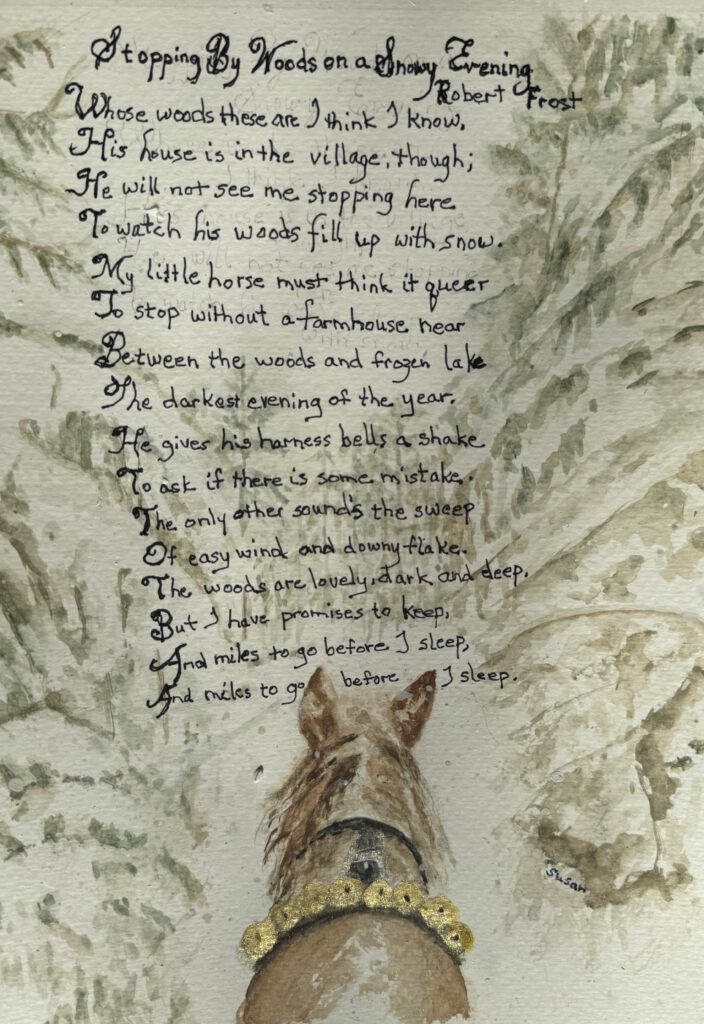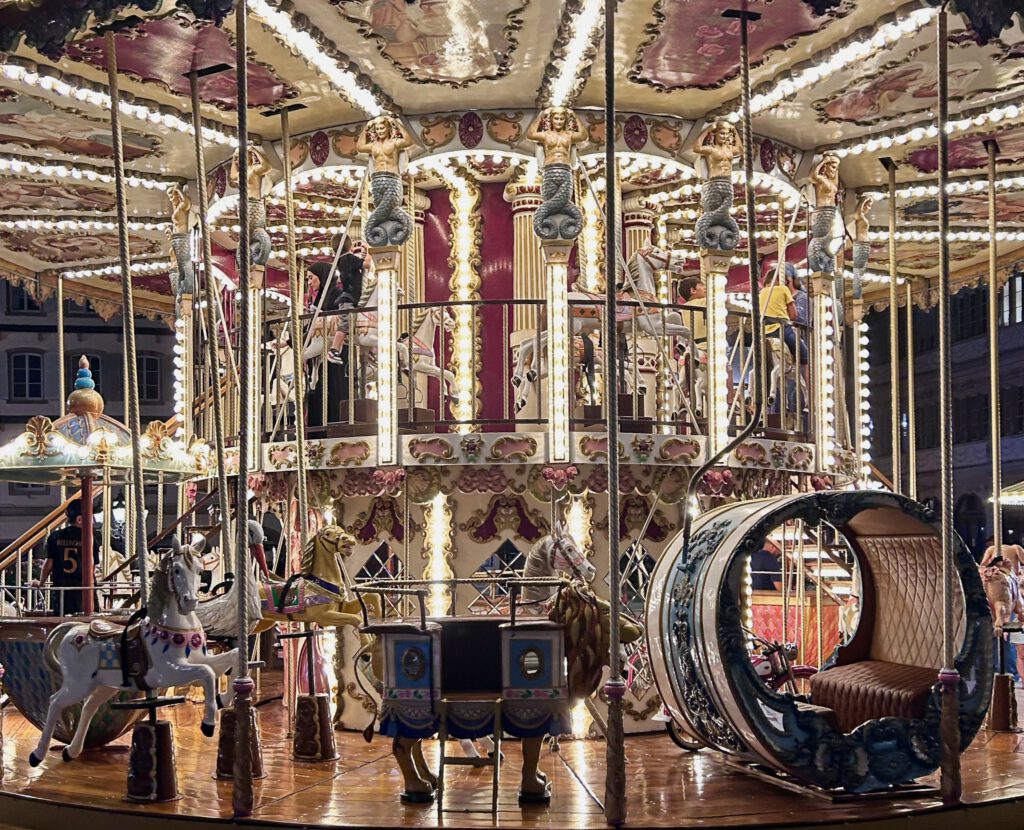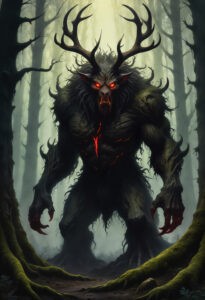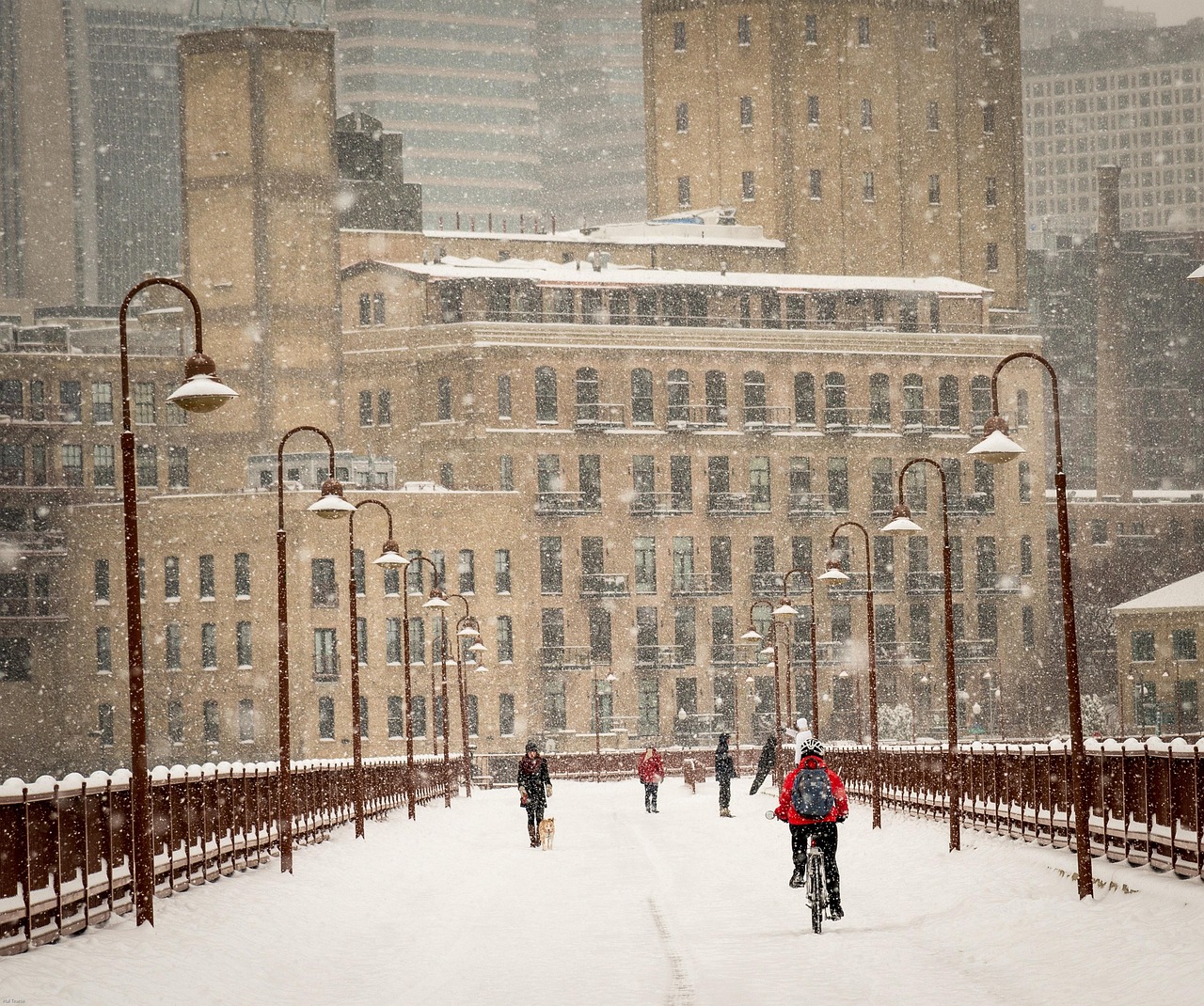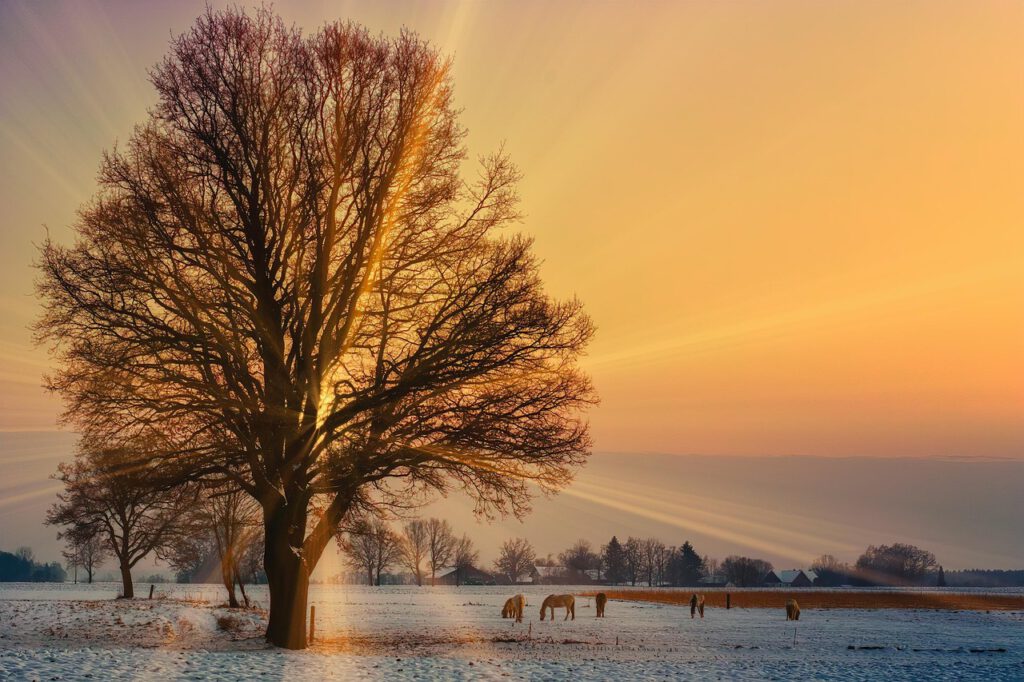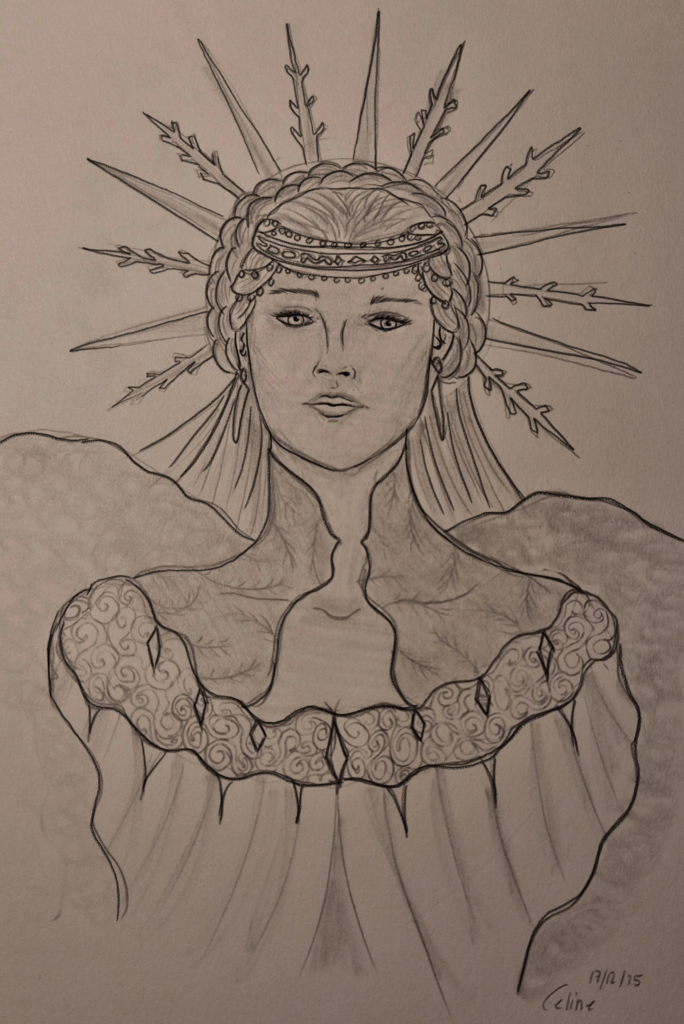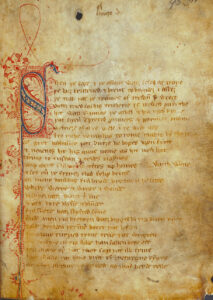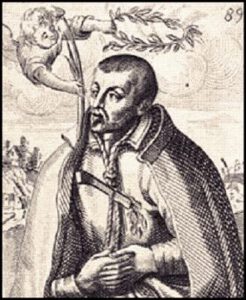Revisitings and Repetitions in Beckett's Later Works1)
John Brown Russell
Published in Connotations Vol. 7.3 (1997/98)
Dublin is a city set among gentle hills and the open sea. Arriving there when the sun shines in April or May, one's spirits rise. Its streets, marked by some noble but not overpowering buildings, can wind and turn unexpectedly and are varied with green and open spaces; and through them flows the river Liffey. The quadrangles of Trinity College Dublin, where Samuel Beckett was a student, are domestic spaces as well as halls of learning with an ancient library and central belltower; and within their squares are wide−spreading trees of great age. Dublin is a centre for government as well as culture, business, and trade; before the traffic jams of the present time, a town of easy, companionable access, well−suited for convivial meeting, eating, and drinking, for being seen and heard among a small yet varied society.
Dublin has also been a town of great divisions: Irish and English (of long, bloody, and often shameful history); Catholic and Protestant; and, under a surface similarity, the difference between people whose entire lives are centred in this engaging city and those (often to become exiles, such as Wilde, Shaw, and Joyce) who know a wider field of reference and are accustomed to move into a world elsewhere.
Samuel Barclay Beckett was born of Protestant parents at Foxrock, County Dublin, within easy distance of the city by rail or, today, by road. Although he lived in the country, his home was modern, comfortable, and suburban−looking and his father's business was based in the city. The records have raised some doubts of the actual day of birth but, now, we surely know that it was Friday, 13th April, 1906, in that year the day celebrated as Good Friday. After early schooling, he was sent north to Portora Royal School, an old institution modelled on English Public Schools and situated in [→page 291] beautiful, lakeland countryside near Enniskillen. University years followed at Trinity College in Dublin and so on to postgraduate unemployment, varied with writing which he considered serious above all else he did, whether poems or journalism; and varied too with school−teaching, long walks in the countryside, and visits abroad, notably two years in Paris, two more in London, and almost a year in Germany. During this time, in 1935, his father Bill Beckett died: "I can't write about him," he told a friend, "I can only walk the fields and climb the ditches after him."2)
James Knowlson's careful and loyal biography, published in 1996, has made all this widely known, and more too that is relevant to Beckett's decision, in October 1937, to leave Ireland and live permanently in Paris. The same source also gives reasons for his brief return to the place of his birth in 1946, after World War II. These events were to affect Beckett's writing and an attempt to understand this influence must involve some retelling of Professor Knowlson's account of the main facts.
Until September 1937, Beckett became increasingly at odds with his mother, May Beckett. Although unable to understand her younger son, she continued to make a home for him, and watched and criticised. After crashing a car into a truck, Beckett was prosecuted for dangerous driving, a charge to which he determined to plead "not guilty." This impending court case and its publicity, together with his willingness to appear as a witness in a libel case, provided the occasion, Professor Knowlson believes, for Beckett's last unsupportable disagreement with his mother. Swiftly he made arrangements to leave for Paris and, as he wrote to his friend Tom MacGreevy, his arrival there was "Like coming out of gaol in April."3)
On a small private income and what could be earned from occasional journalism and translation, Beckett set himself up in a restricted way of life in Paris, glad to be free of home. Then war came: Ireland was neutral, but Beckett took an active part in Gloria, an information−gathering cell of the French resistance in Paris. When colleagues were betrayed to the Germans, Beckett was advised to escape to the South, where he subsequently lived among the farms near Roussillon in Provence, uncertain of his safety. Alfred Péron, a close friend since Trinity College days and fellow member of Gloria, was arrested by the Gestapo and died shortly after his release by the Red Cross in 1945.
[→page 292] It was not until 1946, with the War over, that Beckett was able to revisit his homeland and birthplace for the first time in nine years, an event, on his own testimony, that had major effects on his life and his writing. He saw at once that his mother was far from well, being in the first grips of Parkinson's disease; she was now 74 years old and had moved into a much smaller house. While staying with her, he saw old friends in Dublin and walked, usually alone, on the hills around Foxrock and by the seashore. He also had "a vision"—that is his own word for it—which led him to see himself and his life's work in a new way. The importance of this revelation is shown by the five years of intense creativity that followed when all his newly published work, fiction and drama, was written in French, not English.
A passage in Krapp's Last Tape has long been taken as a description of the vision he received when revisiting his home. This solo play, written some twelve years later, in 1958, has an unusual number of direct personal references, among the most recognizable being his mother's Kerry Blue terrier, his walks in the hills with his father, a published work that did not sell, nights alone in a pub. Krapp has made autobiographical recordings during the course of his life and is now listening to them, interrupting whenever he no longer has patience with his own earlier thoughts:
Spiritually a year of profound gloom and indigence until that memorable night in March, at the end of the jetty, in the howling wind, never to be forgotten, when suddenly I saw the whole thing. The vision at last. This I fancy is what I have chiefly to record this evening … . What I suddenly saw then was this, that the belief I had been going on all my life, namely [Krapp switches off impatiently, winds tape forward, switches on again]—great granite rocks the foam flying up in the light of the lighthouse and the wind−gauge spinning like a propeller, clear to me at last that the dark I have always struggled to keep under is in reality my most [Krapp curses, switches off, winds tape forward, switches on again]— unshatterable association until my dissolution of storm and night with the light of the understanding and the fire.4)
Inevitably, this passage has been seized upon as an explanation of Beckett's own "vision." The occasion and the jetty have both been identified: the year was in 1946 during one of his lone walks and the place Dun Laoghaire Pier that shelters a harbour from the Irish Sea. However, Beckett himself has given two different versions. He is reported to have told Eoin O'Brien, [→page 293] author of (1986), that the storm and wind gauge in Krapp's Last Tape were both inventions but there had been a revelation that had changed his attitude to his own writing. This "had taken place further down the coast … [at] the little jetty that juts into the sea at Killiney Harbour, which is overlooked by his brother's house."5) To his authorized biographer, on the contrary, Beckett was quite definite in identifying another location: "Krapp's vision," he said, "was on the pier at Dun Laoghaire; mine was in my mother's room." And in The Beckett Country, he added, "Make that clear once and for all."6) Whether the vision is associated with his country walks and long broodings, looking out to sea with the mountains behind him, or whether it came from within his mother's own domain, all accounts agree that it occurred when he was revisiting his earlier home.
The nature of the revelation is more securely documented. Beckett "saw" at this moment that he must accept and write about his own ignorance, what he did not and could not know, what remained stubbornly dark in his mind; rather than taking the opposite course of trying to use all that he knew or thought he knew. "I became aware," he said, "of my own folly. Only then did I begin to write the things I feel." On another occasion, comparing his work to that of James Joyce, he said: "I realised that my own way was in impoverishment, in lack of knowledge and in taking away, in subtracting rather than in adding."7)
Written in French and dealing with his sense of what is unknown and unknowable, Beckett's work from 1946 to 1950, when his output seemed unquenchable, offers few specific remembrances of the places or events of his life. The plays take place in almost anonymous landscapes or in rooms that bear little resemblance to any in which he, or anyone else, could actually have lived. The action always takes place in unspecified time, after much has already happened about which the audience is not informed. The author seems purposefully to have obliterated all clear reference to any recognizable place or particular occurrence. A few echoes from Beckett's past can be discerned in the texts, but progressively, in a series of small revisions, he was to lessen some of these, making them more vague, and removing some of them altogether. If he was to write about his own ignorance, all that actually happened would only confuse matters.
[→page 294] Beckett, nevertheless, revisited his home ground to see his ailing mother once every year until her death in 1950 and the last time of seeing her was also to leave a clear mark, six years later, in the text of Krapp's Last Tape. Among the index to his tapes, Krapp finds "Mother at rest at last", together with "The black ball … The dark nurse… " and so on. A little later he starts singing a hymn:
Now the day is over,
Night is drawing nigh−igh,
Shadows—
He then has a fit of coughing and switches on his tape machine to hear its account of "the year that is gone" during which the voice says:
there is of course the house on the canal where mother lay a−dying, in the late autumn, after her long viduity and the … (57)
He switches off and industriously busies himself with an enormous dictionary, checking the meaning of viduity. The tape resumes with:
[the] bench by the weir where I could see her window. There I sat, in the biting wind, wishing she were gone. I was there when [Krapp switches off, broods, switches on again.]—the blind went down, one of those dirty brown roller affairs. I happened to look up and there it was. All over and done with, at last … (59−60)
A small white dog, a black ball and a dark−haired nurse also feature in this remembered moment, or rather, as Krapp says on tape: "Moments. Her moments. Her moments, my moments. [Pause.] The dog's moments." It is immediately after this evocation of particularities, in their unremarkable and tatty detail, that the tape speaks of Krapp's vision. However Beckett, and not Krapp, did, in fact, respond to his mother's death, the time that he had spent revisiting Ireland, and much that had happened there previously were to stay in his mind unforgettably.
* * *
[→page 295] Earlier than Krapp's Last Tape, Ireland and events of life at home had been remembered in a work commissioned by the British Broadcasting Corporation, a first radio play called All That Fall (1956). Written in English, none other of Beckett's dramatic works is so grounded in a particular place or so redolent of the sights and sounds of the countryside around Foxrock and the railway line from Dublin. Personal memories mix with fiction repeatedly: his mother's church−going, his father's race−going; the Protestant hymns he would sing on Sundays, the sounds heard along the road connecting Foxrock to the station. He had often taken the train to Dublin and sometimes walked this road home early the next morning. Character−names in the play are those of people he knew as a boy, some slightly changed. Connolly's van in the play comes from Connolly's Stores in neighbouring Cornelscourt; the dung−cart was a familiar sight on the roads in his childhood days.
Memory brings laughter here rather than nostalgia, but this is, nonetheless, a very brutal play. Mrs Rooney, the central character is hugely and disablingly overweight. She struggles to the railway station, getting a lift towards the end in a car belonging to Mr Slocum who repeatedly grinds the gears and runs over a hen that gets in his way. Arriving at last, Mrs Rooney finds that the train from Dublin is late and it seems at first that Mr Rooney has not been on it. Eventually, however, she and Dan, her blind husband, struggle home in a high wind followed by a downpour of rain. They pass an open door from which the same music can be heard on a gramophone as she had heard on her outward journey: "Death and the Maiden." They hear yet stranger sounds, as well: "… the Lynch twins jeering at us"(Shorter Plays, 31), and then another cry which halts their talk: "Mrs Tully … ," Mrs Rooney explains, "Her poor husband is in constant pain and beats her unmercifully" (33).
The play ends before they reach home. Jerry, a small boy who usually guides the blind man back from the station, catches up with them to return something looking like a ball that Mr Rooney had left behind, probably in the Gents at the station. When Mrs Rooney asks what had delayed the train, her husband tries to stop the boy telling her, but without success. A little child, she is told, had fallen out of a carriage onto the line and was killed under the wheels. This does not square with what her husband has [→page 296] just said and something said earlier may lead an audience to think that Mr Rooney himself had pushed the child from the compartment that he usually had to himself: when jeered at by the Lynch twins, he had asked his wife:
Did you ever wish to kill a child? [Pause.] Nip some young doom in the bud. [Pause.] Many a time at night, in winter, on the black road home, I nearly attacked the boy. [Pause.] Poor Jerry! [Pause.] What restrained me then? [Pause.] Not fear of man. [Pause.] Shall we go on backwards now a little? (31)
Six years after his mother's death, Beckett set childhood memories into this painful comedy about a woman struggling homewards, with little hope beyond reaching home, and leading a blind husband who has a resentment against the bloom of youth. As usual with Beckett's plays, an audience looking for a story has to piece together fragments of exposition, not least the child who had been in the railway carriage when the train left town and dies on the way; the boy who guides the man and brings the lost unidentified object; and Minnie, the daughter mourned by Mrs Rooney who can see herself as:
just a hysterical old hag … , destroyed with sorrow and pining and gentility and church−going and fat and rheumatism and childlessness. [Pause. Brokenly.] Minnie! Little Minnie! [Pause.] Love, that is all I asked, a little love, daily, twice daily, fifty years of twice daily love like a Paris horse−butcher's regular, what normal woman wants affection? (14)
The play is a nightmare that fills the hearer's mind, a comedy that is grotesque beyond any reflection of reality: as a radio play, it did not have to be stageable. Its story of the journeys of an undaunted wife and her husband is not that of the author's earlier life, but it contains and transforms more memories of that life than any earlier play. The whole work is haunted and afflicted by Death and the Maiden, the mockery of twin children, a child dying helplessly, a willing boy who says what he knows very simply despite its horror, and a dead, perhaps stillborn, infant.
* * *
[→page 297] After such memories and reworkings, why should Beckett return in fact or in his fictionalized work to this place? And yet he revisited Ireland numerous times on personal affairs and his homeland continued to be recollected in his writing. The last short works have numerous echoes of his early life in and around Foxrock but now the nightmarish comedy has almost vanished. Beckett imagines himself a boy again, sitting on his "tiny cycle" at the gate of his family home, playing with the dog, walking over the fields along with his father, being reproved by his mother for climbing a tree in the garden and throwing himself off a high branch, his fall broken by a lower branch. All these small incidents and visual memories are in Company (1977), a prose fiction in which Beckett imagines a man lying on his back in the dark with only two voices for company, one attempting to define his present existence and the other recollecting his past.
The change of style, purpose, and mood, when compared with earlier revisitings, could hardly be greater within Beckett's range, and there are changes, too, in the remembered world and its fictional recreation. Images of the past centre now on a single young boy with his mother and father. Close−up memories are rather fewer, but clearer: gone are the stationmaster and carter, the car, train, bicycle, and donkey; animal sounds, music, wind, and driving rain. Instead of a journey back and forth along one road, several long country walks are described, starting with that of the father while the mother was in labour on a Good Friday morning. Most noticeably, a new dimension is given when the boy, or the man he is to become, gazes into the distance, as he does in the very first account of what had once happened:
A small boy you come out of Connolly's Stores holding your mother by the hand. You turn right and advance in silence southward along the highway. After some hundred paces you head inland and broach the long step homeward. You make ground in silence hand in hand through the warm still summer air. It is late afternoon and after some hundred paces the sun appears above the crest of the rise. Looking up at the blue sky and then at your mother's face you break the silence asking her if it is not in reality much more distant than it appears. The sky that is. The blue sky. Receiving no answer you mentally reframe your question and some hundred paces later look up at her face again and ask her if it does not appear much less distant than in reality it is. For some reason you could never fathom this question must have angered her exceedingly. For she shook off your little hand and made you a cutting retort you have never forgotten.8)
[→page 298] In the distance, as well as the sky, are hills and fields, and the sea. In almost every remembered incident, distance is part of the setting. We are told that the room in which the boy was born, and as likely as not conceived, had a big window that
… looked west to the mountains. Mainly west. For being bow it looked also a little south and a little north. Necessarily. A little south to more mountain and a little north to foothill and plain. (15−16)
The sea and a great height are remembered when he is taken by his father to swim and dive in a pool at the seaside:
You stand at the tip of the high board. High above the sea. In it your father's upturned face … He calls to you to jump. He calls, Be a brave boy … The far call again, Be a brave boy. Many eyes upon you. From the water and from the bathing place. (23−24)
Distance holds mysteries, as when
You slip away at break of day and climb to your hiding place on the hillside. A nook in the gorse. East beyond the sea the faint shape of high mountain. (32−33)
Because he has seen this mountain across the sea before and had been derided for thinking so—it must have been a cloud, he was told—on this occasion, he waits before returning home at nightfall and then goes supperless to bed. Once there:
You lie in the dark and are back in that light. Straining out from your nest in the gorse with your eyes across the water till they ache … Till in the end it is there. Palest blue against the pale sky. You lie in the dark and are back in that light. Fall asleep in that sunless cloudless light. Sleep till morning light. (33−34)
In All that Fall, Mrs Rooney encounters numerous people and animals, but here the "cast" is only the boy, his mother and father, and a few people directly associated with them. Only three encounters may be said to be outside the family, each very different from the others. First is a beggar woman at the gate of his home; he opens it for her to enter and she blesses him. Next, a hedgehog is seen in the garden as it parts the edging and is [→page 299] about to cross a path: the boy takes "pity on it" and picks it up, finds a box for it, puts it in a hutch, finds worms for it to eat. He gives a "last look to make sure all is as it should be before taking [himself] off to look for something else to pass the time." He feels a "glow" kindled by his "good deed" and includes the hedgehog in his bedtime prayer asking "God to bless all [he] loved." The following morning he feels uneasy about the hedgehog and some days pass before he goes back to the hutch. When he does, he finds only the "stench" and the "mush" of the dead creature (38−41).
The third encounter is with a young girl with dark hair and about his own age. They also meet in the garden, this time in a rustic summerhouse with stained glass windows:
… open your eyes to find her sitting before you. All dead still. The ruby lips do not return your smile. Your gaze descends to the breasts. You do not remember them so big… .
She too did you but know it has closed her eyes. So you sit face to face in the little summerhouse. With eyes closed and your hands on your pubes. In that rainbow light. That dead still. (58−59)
A little later:
You are on your back at the foot of an aspen. In its trembling shade. She at right angles propped on her elbows head between her hands. Your eyes opened and closed have looked in hers looking in yours. In your dark you look in them again. Still. You feel on your face the fringe of her long black hair stirring in the still air. Within the tent of hair your faces are hidden from view. She murmurs, Listen to the leaves. Eyes in each other's eyes you listen to the leaves. In their trembling shade. (66−67)
In Company memories are often very precise and intimate, but they also have a stillness and an awareness of great distance. Instead of the weeping and outbursts of tortured lives, the cries here are almost unheard. Instead of struggle and storm and the multiple sounds of coming and going, the setting here is often full of light or darkness, dazzling and trembling light or an obliterating night. Its keenest moments, when the narration momentarily stops, are mysterious although occurring in unremarkable surroundings. Some sensations are never to be forgotten, but Company does not always say what they were.
[→page 300] Sometimes its prose has the lightest possible punctuation, so that the reader has to pick a circumspect and questioning way through long paragraphs. At other times, frequent fullstops arrest progress and alert the reader to take special care and hesitate, perhaps, before proceeding. Time moves backwards and forwards in narration of the past but, in the present, it can seem unable to move as the other voice that is heard by the man lying on his back in the dark is repetitive in much the same mood and tone, "with only minor variants" (20). Little laughter is here, which had been abundant among the violence and doom of All That Fall but, correspondingly, pain is mostly offset by a movement away from narration of an event into some other happening or some far−fetched reaction; alternatively the voice speaking of the past yields to the repetitive, insistent, calculating, taunting pronouncements of the other and quite different voice. Sometimes forward impetus seems to be altogether lost in silence and stillness, and in lone contemplation of the great distances.
In Company, Beckett has remembered the place of his childhood, looking back, now, with neither nostalgia nor anger. Pain has almost disappeared except for an aching wonder at the world's immensity and the short flushes of goodness and tender love, about which he writes with delicate care. By the end of the fiction, both its voices have stopped, in "labour lost and silence" (89). Memories of the place revisited have left the writer, now near the end of a long life, writing about being, as he always was conscious of being, "Alone." That word is from the reasoning, insistent voice that comes to the man lying on his back in the dark and here it is given a paragraph all to itself.
The irony of writing for other people to read when writing about being absolutely alone was not lost on Beckett: "I can not go on: I'll go on" is a refrain in much of his work. But the darkness from which he knew he must write, ever since that "vision" on his first return home after the war, was also now the darkness of preparing for his own death. "Labour in vain" (88) and "labour lost" (89) says the reasoning voice; but the work is not useless, for the fiction holds at its centre, for readers to enter in imagination for themselves: a person returning into the dark from which his inspiration and actual life have both come.
* * *
[→page 301] Beckett's imagination was so quickened by his early life in and around Foxrock in those works which contain explicit memories from that time, that a reader is tempted to look for less explicit memories elsewhere, among the amazing output of 1946 to 1950 when his plays and fiction seemed to insist on being written.
Waiting for Godet, written in French between October 1948 and January 1949, has been explicated in many ways. The play presents two turns, from the European circus and clown traditions. It reworks the author's experience when living in some fear of arrest in Provence during the last years of the war and alludes (in Lucky's maltreatment) to the tortures of concentration camps. The road and tree, the isolated figures in a bare landscape of farmlands, the rising moon at the close, the pair of boots placed side by side at the front of the stage, are all images that might have been taken from Van Gogh's paintings, which come to mind readily in that part of France.9) The isolated persons in paintings by his friend, Jack Yeats, were figures in which Beckett said that he read his own sense of "2 entities that will never mingle" and James Knowlson has compared them to Estragon and Vladimir in Waiting for Godot.10) Less easily identified must be the influence of expressionist plays which are about Everyman or the human condition in a Western once−Christian culture, rather than about individuals taken directly from life as lived at a particular time. Music must also be considered an influence: Godot can be seen as a composition in which proportion, repetition, rhythm—the very shape of dialogue—can give meaning or, at least, force and clarity to fragments of speech and action that are in themselves unremarkable; so patterns of behaviour emerge out of a careful accumulation of moments almost discreet in themselves.
Criticism has found many instruments with which to estimate the astonishing depth and durability of Waiting for Godot, but Company, All That Fall, and other works with autobiographical memories can draw another net over its surface catching certain other elements that may have greater force than at first appears. The place revisited immediately before the productive years of 1946 to 1950, and again in several later years, re−awakened certain memories that were so powerful when he came to write about them that they might have arisen almost unconsciously in creative [→page 302] work that was not directly concerned with Ireland and Beckett's early years. The fascination with distance found in Company can be seen also in the very basis of the play written almost thirty years earlier. Godot's opening direction calls simply for "A country road" but, on stage, going from side to side, it could well be that road in Company that was "nowhere in particular" but going as far as any road might "on the way from A to Z" (30). Distance is also present when Vladimir and Estragon stand back to back, gazing into the distance, each able in the silence to see "nothing"; after a "Long silence" and still seeing nothing, Vladimir tells Estragon that he "must have had a vision"11). Also, in the play, the distant sky is stared at when night falls and the moon rises. The setting of Godot is not only a road but also a limitless space that is eventually almost darkness.
While absolute darkness is not on stage in Godot as it was in the fiction of one person alone in Company, it is certainly there in the imagination of the play's characters. For Vladimir, all activity and talk is an attempt to "prevent our reason from foundering" when it has "long been straying in the night without end of the abyssal depths" (p. 80). When Pozzo goes blind in Act II, he recognizes a darkness that surrounds all life:
They give birth astride a grave, the light gleams an instant, then it's night once more. (89)
The light of a cloudless day as well as the darkness of night together provided the ultimate reaches for remembrance of the past in Company and they are both evoked by Lucky: the "heaven so blue still and calm" in close and fixed opposition to "the great cold the great dark" (43, 44). Whereas in Company these are recurring elements of the experience of the central character's recollections of the past, the double vision is most sustained in Waiting for Godot by Lucky, the "knock" and the one person who, as Pozzo says, might possibly speak of "Beauty, grace, truth of the first water" (33). Behind the events of this play lies the same dichotomous existence.
One element from the later pieces with autobiographical memories is found in two crucial events in Godot: the entrances of the boy who carries messages to Vladimir and Estragon and says he looks after the goats belonging to an unseen Mr Godot but is not beaten like his brother. He may not simply be a tantalizing "child" (48), but a person firmly in Beckett's memory and bringing with him an amalgam of many past moments. He [→page 303] may have entered the play from earlier experiences as might the boy whom Mr Rooney wished to kill, who gives the news of the dead child that Mr Rooney does not want told and brings the forgotten object back to its owner. He may have come from the memories of the boy at the centre of Company, who had prayed for loved ones at bedtime, who could feel the "flush" of goodness intermittently, who was bidden by his father to be a brave boy as he stood high above the water, who could lie still in bed at night as if on a hill looking out to sea and discerning a pale blue mountain: a boy not unlike his author, perhaps, as he gazes into the distance of the sky or wonders at marvellous light. The boy in Waiting for Godot might, just possibly, be standing in for such a person.
Reading the later works may also bring greater awareness of the pain implicit in Waiting for Godot. Echoes of wartime experiences can be found in Godot's waiting, weariness, uncertainties, off−stage beatings, and repeated disappointments but, beyond this, its suffering seems to have general rather than particular origins. These persons suffer because they are part of a disappointed world at least as much as the result of their own specific actions or reactions; their pain seems existential. No one explains why Estragon's feet ache or why he is beaten, why Vladimir can be so appalled, why Pozzo is in agony, or Lucky has to be a slave. In contrast, much of the suffering in All That Fall and Company is the responsibility of the persons involved. While the wind and rain, and much else besides, are not caused by mankind, the more particular pains in the radio play derive from individual actions and reactions: Mrs Tully's from her husband's reactions to his own pain, Mrs Rooney's from the loss of a child and from overeating, Mr Rooney's from a loveless marriage and unrewarding job. Uncertainty clouds the cause of suffering for the child who fell from the train, but clearly it too must have had its particular causation in individual human action. The pain experienced by the boy in Company derives almost exclusively from his own curiosity and complicity, whether asking about the distance of the sky, or asserting that a far distant mountain existed as it did in his mind, or jumping from a high tree or hesitating before jumping from high above the water, or feeling [→page 304] remorse for taking pity on a hedgehog, or not thinking that a young woman's breasts were as large as they obviously were so that it might be she was "with child." The boy's pain in Company may not be as excruciating as Lucky's in Godot, but it comes directly out of his own will to be and to think, and is experienced in moments of happiness or goodness as well as coercion or fear. Encountering these other forms of pain in later, more autobiographical work, a reader may suspect the suffering in Waiting for Godot is more rooted into the actualities of lived experience, the pressures and responsibilities of every day, than the play itself makes clear. A second thought about the sufferings of its characters leads the mind back from existential issues to the consequences of actions by individual persons and the bent of their own minds: to their desire for friendship or "truth of the first water," a search for something more satisfying than what was on offer, some other world across the sea, or a recognition of fear and, possibly, guilt.
Middlesex University
































 Ring out, wild bells, to the wild sky,
Ring out, wild bells, to the wild sky,







